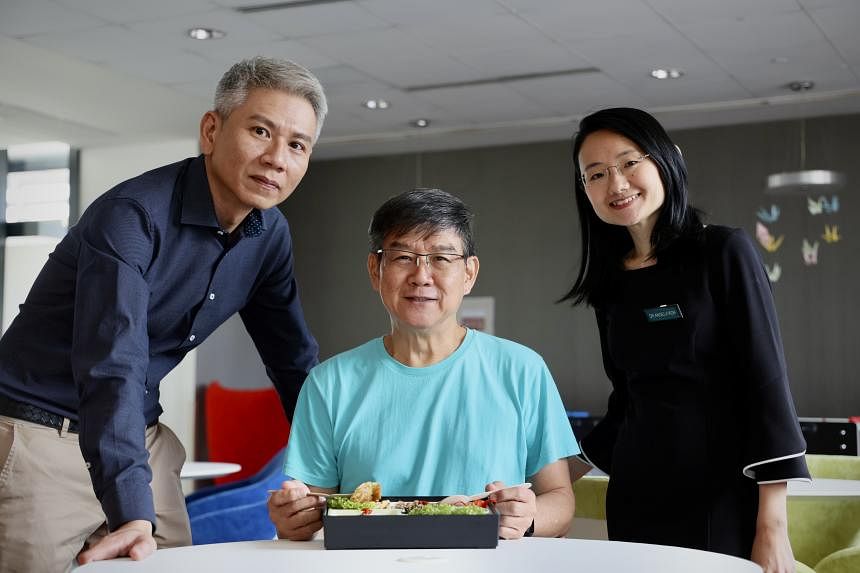SINGAPORE – Part-time office manager Sim Teng Kok, 60, recently had a bento meal of spaghetti with meatballs, stir-fried chicken, scrambled egg with vegetables and stir-fried celery with mushrooms – designed for him by a research team at the National Heart Centre Singapore (NHCS).
It was part of a three-month plan that also includes 12 exercise sessions guided by a physiotherapist at the centre.
The plan comes under a five-year NHCS research study, which aims to help older adults delay the onset of cardiovascular disease by tackling frailty. The study has received a $4.7 million grant from the Ministry of Health.
Mr Sim has no family history of heart conditions, but he has a history of palpitations that worries him. He first experienced heart palpitations in 2020. When it occurred again and again in the same week with no warning, he consulted a specialist, who advised him to exercise and keep active.
His palpitations have occurred on and off since then, he said. When he saw in the Health Buddy app a recent call for volunteers to join the NHCS research programme, he signed up.
He is among the 15 older adults selected for the programme so far, after going through a series of tests to measure their baseline cardiovascular health status and frailty assessment such as hand-grip strength tests and gait analysis.
The researchers are looking out for physical frailty such as skeletal muscle weakness, early changes in their cardiac biomarkers, and cardiac function.
Mr Sim will be assessed with various tests after three months, said Associate Professor Angela Koh, a senior consultant from NHCS’ cardiology department, who is leading the research team in the study.
Launched in July, the study aimed to recruit 400 participants who are either cardiac frail (have a weak heart) or at risk of frailty. They will go through a programme that will offer them a 12-week meal plan and, for those who are suitably fit, a customised exercise programme, at no cost to them.
“We are really looking at delaying frailty as an additional risk factor,” said Prof Koh.
A senior with cardiovascular disease will be at greater risk of complications if he develops frailty, while one who is yet to have heart disease but develops frailty may be at higher risk of developing the disease, she said at a briefing on Wednesday.
Earlier studies have established the cardio-sarcopenia syndrome, where the weakening of the heart is happening together with the weakening of skeletal muscle mass in patients.
Prof Koh said that looking at some of the biochemistry underlying these changes in those studies has allowed the research team to put together a programme, for instance, with specific micronutrients in the meal plans that target the nitrogen pathways that govern the weakening of the heart and heart muscle.
She hopes the study will help to raise the awareness of the need to screen routinely for frailty because frailty is now recognised as a risk factor for cardiovascular disease. They also hope to educate more people that having targeted diet and exercise interventions against frailty lowers their risk of developing heart disease.
A previous study that offered an exercise programme similar to the current one for the five-year study showed that there was an improvement in the patients’ heart function and reduction in the stiffness of the heart after three months, which would help lower the risk of cardiovascular disease, said Prof Koh.
With the addition of curated diet plans, this intervention plan might be even more effective, she added.
One in 140 people in S'pore at risk of premature heart attack due to gene mutation
Study finds heart attack patients without conventional risk factors fare worse
There are currently six types of bento meals under the programme. They are curated according to three healthcare settings. The NHCS programme is being conducted at acute hospitals, community hospitals and outpatient clinics.
Private caterer Nigel Kok, who was at the briefing, said the meals are cooked with less salt and healthier oils, such as those that have the Healthier Choice symbol. They also contain a variety of vegetables and a certain amount of protein and carbohydrates.
The bento meals will be offered two to three times a week.
The participants in community hospital settings will go through six or 12 exercise sessions, lasting 60 to 90 minutes each, guided by trained physiotherapists. Those going for follow-up visits at outpatient clinics in the community will have 12 sessions.
Acute hospital patients do not go through an exercise programme, until they move to a community hospital or are discharged to return home.
Under this study, the research team is also piloting a kiosk at NHCS that conducts some of the tests in frailty screening. The kiosk measures the patient’s skeletal muscle mass, blood pressure and visceral fat – essential data to determine one’s cardiovascular health in conjunction with frailty.
Institutions participating in the research programme include NHCS, Changi General Hospital, Sengkang General Hospital, Singapore General Hospital, Alexandra Hospital and Jurong Community Hospital, as well as collaborators from Tan Tock Seng Hospital and National Healthcare Group Polyclinics.
Detecting, monitoring heart disease gets an edge from AI with new lab at National Heart Centre
New invention a plus for heart surgery, hastening recovery
Join ST’s WhatsApp Channel and get the latest news and must-reads.
p.st_telegram_boilerplate:before {
display: inline-block;
content: ” “;
border-radius: 6px;
height: 6px;
width: 6px;
background-color: #12239a;
margin-left: 0px;
margin-right: 13px;
}
a.st_boilerplate {
font-family: “SelaneWebSTForty”, Georgia, “Times New Roman”, Times, serif;
}


